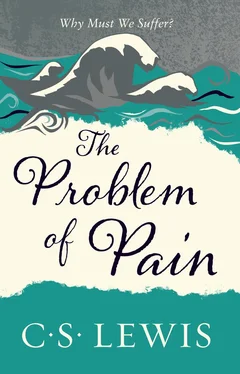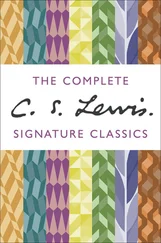C. Lewis - The Problem of Pain
Здесь есть возможность читать онлайн «C. Lewis - The Problem of Pain» — ознакомительный отрывок электронной книги совершенно бесплатно, а после прочтения отрывка купить полную версию. В некоторых случаях можно слушать аудио, скачать через торрент в формате fb2 и присутствует краткое содержание. Жанр: unrecognised, на английском языке. Описание произведения, (предисловие) а так же отзывы посетителей доступны на портале библиотеки ЛибКат.
- Название:The Problem of Pain
- Автор:
- Жанр:
- Год:неизвестен
- ISBN:нет данных
- Рейтинг книги:5 / 5. Голосов: 1
-
Избранное:Добавить в избранное
- Отзывы:
-
Ваша оценка:
- 100
- 1
- 2
- 3
- 4
- 5
The Problem of Pain: краткое содержание, описание и аннотация
Предлагаем к чтению аннотацию, описание, краткое содержание или предисловие (зависит от того, что написал сам автор книги «The Problem of Pain»). Если вы не нашли необходимую информацию о книге — напишите в комментариях, мы постараемся отыскать её.
The Problem of Pain — читать онлайн ознакомительный отрывок
Ниже представлен текст книги, разбитый по страницам. Система сохранения места последней прочитанной страницы, позволяет с удобством читать онлайн бесплатно книгу «The Problem of Pain», без необходимости каждый раз заново искать на чём Вы остановились. Поставьте закладку, и сможете в любой момент перейти на страницу, на которой закончили чтение.
Интервал:
Закладка:
We can, perhaps, conceive of a world in which God corrected the results of this abuse of free will by His creatures at every moment: so that a wooden beam became soft as grass when it was used as a weapon, and the air refused to obey me if I attempted to set up in it the sound-waves that carry lies or insults. But such a world would be one in which wrong actions were impossible, and in which, therefore, freedom of the will would be void; nay, if the principle were carried out to its logical conclusion, evil thoughts would be impossible, for the cerebral matter which we use in thinking would refuse its task when we attempted to frame them. All matter in the neighbourhood of a wicked man would be liable to undergo unpredictable alterations. That God can and does, on occasions, modify the behaviour of matter and produce what we call miracles, is part of Christian faith; but the very conception of a common, and therefore stable, world, demands that these occasions should be extremely rare. In a game of chess you can make certain arbitrary concessions to your opponent, which stand to the ordinary rules of the game as miracles stand to the laws of nature. You can deprive yourself of a castle, or allow the other man sometimes to take back a move made inadvertently. But if you conceded everything that at any moment happened to suit him—if all his moves were revocable and if all your pieces disappeared whenever their position on the board was not to his liking—then you could not have a game at all. So it is with the life of souls in a world: fixed laws, consequences unfolding by causal necessity, the whole natural order, are at once limits within which their common life is confined and also the sole condition under which any such life is possible. Try to exclude the possibility of suffering which the order of nature and the existence of free wills involve, and you find that you have excluded life itself.
As I said before, this account of the intrinsic necessities of a world is meant merely as a specimen of what they might be. What they really are, only Omniscience has the data and the wisdom to see: but they are not likely to be less complicated than I have suggested. Needless to say, ‘complicated’ here refers solely to the human understanding of them; we are not to think of God arguing, as we do, from an end (co-existence of free spirits) to the conditions involved in it, but rather of a single, utterly self-consistent act of creation which to us appears, at first sight, as the creation of many independent things, and then, as the creation of things mutually necessary. Even we can rise a little beyond the conception of mutual necessities as I have outlined it—can reduce matter as that which separates souls and matter as that which brings them together under the single concept of Plurality, whereof ‘separation’ and ‘togetherness’ are only two aspects. With every advance in our thought the unity of the creative act, and the impossibility of tinkering with the creation as though this or that element of it could have been removed, will become more apparent. Perhaps this is not the ‘best of all possible’ universes, but the only possible one. Possible worlds can mean only ‘worlds that God could have made, but didn’t’. The idea of that which God ‘could have’ done involves a too anthropomorphic conception of God’s freedom. Whatever human freedom means, Divine freedom cannot mean indeterminacy between alternatives and choice of one of them. Perfect goodness can never debate about the end to be attained, and perfect wisdom cannot debate about the means most suited to achieve it. The freedom of God consists in the fact that no cause other than Himself produces His acts and no external obstacle impedes them—that His own goodness is the root from which they all grow and His own omnipotence the air in which they all flower.
And that brings us to our next subject—the Divine goodness. Nothing so far has been said of this, and no answer attempted to the objection that if the universe must, from the outset, admit the possibility of suffering, then absolute goodness would have left the universe uncreated. And I must warn the reader that I shall not attempt to prove that to create was better than not to create: I am aware of no human scales in which such a portentous question can be weighed. Some comparison between one state of being and another can be made, but the attempt to compare being and not being ends in mere words. ‘It would be better for me not to exist’—in what sense ‘for me’? How should I, if I did not exist, profit by not existing? Our design is a less formidable one: it is only to discover how, perceiving a suffering world, and being assured, on quite different grounds, that God is good, we are to conceive that goodness and that suffering without contradiction.
3 DIVINE GOODNESS
Love can forbear, and Love can forgive…but Love can never be reconciled to an unlovely object…. He can never therefore be reconciled to your sin, because sin itself is incapable of being altered; but He may be reconciled to your person, because that may be restored.
TRAHERNE,
Centuries of Meditation , II, 30
Any consideration of the goodness of God at once threatens us with the following dilemma.
On the one hand, if God is wiser than we His judgement must differ from ours on many things, and not least on good and evil. What seems to us good may therefore not be good in His eyes, and what seems to us evil may not be evil.
On the other hand, if God’s moral judgement differs from ours so that our ‘black’ may be His ‘white’, we can mean nothing by calling Him good; for to say ‘God is good’, while asserting that His goodness is wholly other than ours, is really only to say ‘God is we know not what’. And an utterly unknown quality in God cannot give us moral grounds for loving or obeying Him. If He is not (in our sense) ‘good’ we shall obey, if at all, only through fear—and should be equally ready to obey an omnipotent Fiend. The doctrine of Total Depravity—when the consequence is drawn that, since we are totally depraved, our idea of good is worth simply nothing—may thus turn Christianity into a form of devil-worship.
The escape from this dilemma depends on observing what happens, in human relations, when the man of inferior moral standards enters the society of those who are better and wiser than he and gradually learns to accept their standards—a process which, as it happens, I can describe fairly accurately, since I have undergone it. When I came first to the University I was as nearly without a moral conscience as a boy could be. Some faint distaste for cruelty and for meanness about money was my utmost reach—of chastity, truthfulness, and self-sacrifice I thought as a baboon thinks of classical music. By the mercy of God I fell among a set of young men (none of them, by the way, Christians) who were sufficiently close to me in intellect and imagination to secure immediate intimacy, but who knew, and tried to obey, the moral law. Thus their judgement of good and evil was very different from mine. Now what happens in such a case is not in the least like being asked to treat as ‘white’ what was hitherto called black. The new moral judgements never enter the mind as mere reversals (though they do reverse them) of previous judgements but ‘as lords that are certainly expected’. You can have no doubt in which direction you are moving: they are more like good than the little shreds of good you already had, but are, in a sense, continuous with them. But the great test is that the recognition of the new standards is accompanied with the sense of shame and guilt: one is conscious of having blundered into society that one is unfit for. It is in the light of such experiences that we must consider the goodness of God. Beyond all doubt, His idea of ‘goodness’ differs from ours; but you need have no fear that, as you approach it, you will be asked simply to reverse your moral standards. When the relevant difference between the Divine ethics and your own appears to you, you will not, in fact, be in any doubt that the change demanded of you is in the direction you already call ‘better’. The Divine ‘goodness’ differs from ours, but it is not sheerly different: it differs from ours not as white from black but as a perfect circle from a child’s first attempt to draw a wheel. But when the child has learned to draw, it will know that the circle it then makes is what it was trying to make from the very beginning.
Читать дальшеИнтервал:
Закладка:
Похожие книги на «The Problem of Pain»
Представляем Вашему вниманию похожие книги на «The Problem of Pain» списком для выбора. Мы отобрали схожую по названию и смыслу литературу в надежде предоставить читателям больше вариантов отыскать новые, интересные, ещё непрочитанные произведения.
Обсуждение, отзывы о книге «The Problem of Pain» и просто собственные мнения читателей. Оставьте ваши комментарии, напишите, что Вы думаете о произведении, его смысле или главных героях. Укажите что конкретно понравилось, а что нет, и почему Вы так считаете.












